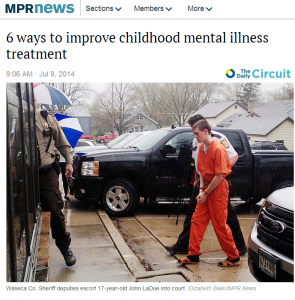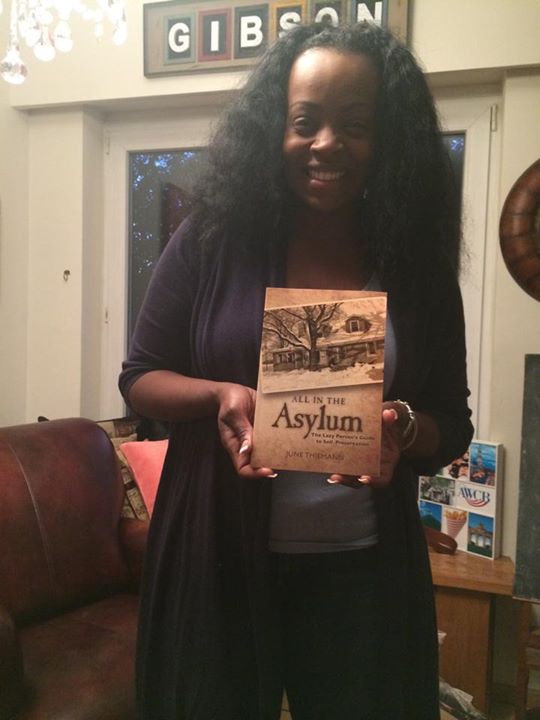It took many years and much gumption to overcome the roadblocks that stood in front of publishing this book. Now that it’s out there and you’ve had a chance to read and digest, please feel free to share your thoughts with a user review. Click here to let your voice be heard.
Q&A With Author June Thiemann

Struwwelpeter or “Shockheaded Peter,” a character from German children’s literature and a term of endearment we gave to the unshowered and unwell on our dead end.
Q: ALL IN THE ASYLUM almost functions like a picture book yet you make the point elsewhere that mental illness is invisible. Why include so many pictures?
A: My experience of mental illness is that it’s not only largely invisible but it also makes a lot of perfectly visible things disappear. I used to pore over my family photos, wondering where everyone had gone. I didn’t really have the words for what I was looking for. Now, I know. Like Dr. Dog, I was wondering, “Where did all the shadow people go?”
Q: This book took a long time. What were some obstacles you faced along the way and where did the breakthroughs come from?
A: One of the most difficult aspects to mental illness is that it’s very difficult to “use your words.” While my experience of mental illness is that it comes and goes, when it happens often enough it will really slow you down (or do the opposite, with roughly the same result).
Q: What happens to you when you experience mental illness?
A: Among other sensations, my words flood or freeze. Nothing flows
Q: What words did your family use for mental illness?
A: In my family, we could talk about someone being “up” or “down” or “mildly schizophrenic” or “bipolar” but we could not say “mentally ill.” This is still a difficult term for a lot of people. In fact, there’s often a lot of effort to re-name things. Thus, the most prominent term that came to be associated with Adam Lanza, the Newtown, CT, shooter was “autism,” which is an increasingly common diagnosis. But this diagnosis can mask other, perhaps riskier states like depression, as Andrew Solomon has written in The New Yorker (http://www.newyorker.com/magazine/2014/03/17/the-reckoning).
Q: How did you find the words at last?
A: I had to learn to see mental illness as no more or less than a sort of cognitive flu that can be quite minor if caught early.
Q: Thoughts about recent events like Robin Williams’ death?
A: I’m just amazed at how long he suffered in silence. Again, he may have had the words for his characters but not for himself.
Q: What would a proactive approach to mental health look like in the case of Robin Williams, for example?
A: It would mainly look like what happens when a loved one dies of prostate or ovarian cancer. The survivors (even those without blood ties) get screened more regularly because they know they’re at risk. In fact, they’ve probably been caring for untreated mental illness for awhile without getting enough support themselves. The toughest thing about mental illness is that you usually can’t see it until you’re well. So, by finding good therapists, social workers, doctors, and/or psychiatrists and seeing them regularly (like you would a dentist), you reduce your chances of disappearing before you realize you’re mostly gone. It may cost a little more co-pays or out-of-pocket expenses but it saves a lot in the long run.
Q: ALL IN THE ASYLUM–it’s a catchy title but what’s it referring to?
A: It’s about where we put mental illness and the mentally ill in our society. We put it “away.” But this has a way of “bringing it all back home,” as Dylan would say.
JUNE THIEMANN’S NEW MEMOIR INTRODUCES A NEW PROACTIVE, PREVENTIVE APPROACH TOWARD MENTAL HEATH
Minneapolis, MN, September 4, 2014– All In the Asylum:The Lazy Person’s Guide to Self-Preservation is slated for release on Sept. 5th, 2014. This important book about family, relationships, parenting, and motherhood chronicles a mother’s return to the dead end where she grew up and finds through her children’s eyes the beauty beyond straitjackets.
All in the Asylum is the first work by June Thiemann, a teacher, writer, and child advocate in Minneapolis. The project began 22 years ago after giving birth to her first son. Naming him after a brother who committed suicide, she began to put names to other absences in the family. She couldn’t complete the memoir until she figured out a strategy to keep herself and her kids from disappearing.
As the author explains, the themes represented in her book seek to provide solace for those trying to make sense of their own mental health or the health of a loved one. “How can anyone hope to spot an illness that by its very nature distorts perception? Instead, why not proactively seek out mental health resources for the family from the get-go?” In response to this model, Dr. Jarrod Leffler, Child and Adolescent Psychologist in the Division of Child and Adolescent Psychiatry at Mayo Clinic, has said, “We don’t typically think of traditional mental health services the same way we think about our primary care provider or our dentist, who is a professional in our lives and who we reach out to and have available to us. We only seek mental health providers in times of crisis or when there’s a concern.” In addition, Dr. Alan Kazdin, professor of psychology and child psychology at Yale University and Director of the Yale Parenting Center, has observed, “We need better assessments all along the way . . . Advances in treatment come from advances in assessment . . . from picking up the problem early and being able to intervene before it’s too late.” (Both comments in response to the author’s proactive model as described on “The Daily Circuit” with Kerri Miller, Minnesota Public Radio, July 9, 2014)
With school shootings and mass murders “off the charts, “ as President Obama said recently, and the numbers of suicide—whether it’s Robin Williams, L ‘Wren Scott, Freddy E, or all the lesser-known suicides of teenagers, baby-boomers, and the elderly—reaching epidemic levels, it’s time for a new approach to mental illness. All in the Asylum paves the way.
# # #
All In the Asylum:The Lazy Person’s Guide to Self-Preservation, published by CreateSpace, is available from Amazon by clicking here.
The author’s progress can also be followed on Facebook
If you would like more information about the book or to speak to the author, please contact June Thiemann by using our Contact Form on this website.
To download a copy of this press release click here.
All in The Asylum Release Slated for September 5th 2014
 All In the Asylum: The Lazy Person’s Guide to Self Preservation is now available for ordering at CreateSpace, an Amazon Company.
All In the Asylum: The Lazy Person’s Guide to Self Preservation is now available for ordering at CreateSpace, an Amazon Company.
“How can there be no room for a family that keeps shrinking? Where can you go to not disappear? Why can more be seen in the shadows than in light? Find out the answers in this memoir about growing up in a large, baby-boom family, ravaged by mental illness. Spanning four generatios and half a lifetime, All in the Asylum is the first work by June Thiemann, a teacher, writer and child advocate.
This important book about Family & Relationships, Parenting and Motherhood by June Thiemann chronicles a mother’s return to the dead end where she grew up and finds, through her children’s eyes, the beauty beyond straitjackets.
The official launch is slated for September 5th 2014.
MPR: How Can We Better Detect Childhood Mental Health Issues?
 Click here to listen to June’s interaction with Kerri Miller and her guests Alan Kazdin: Professor of psychology and child psychology at Yale University and the director of the Yale Parenting Center and Jarrod Leffler: Child and adolescent psychologist in the Division of Child and Adolescent Psychiatry and Psychology at Mayo Clinic – audio starts 12:47.
Click here to listen to June’s interaction with Kerri Miller and her guests Alan Kazdin: Professor of psychology and child psychology at Yale University and the director of the Yale Parenting Center and Jarrod Leffler: Child and adolescent psychologist in the Division of Child and Adolescent Psychiatry and Psychology at Mayo Clinic – audio starts 12:47.
